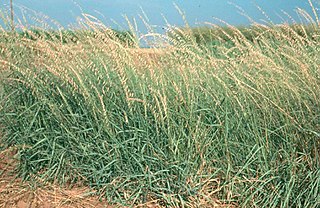
Bouteloua curtipendula, commonly known as sideoats grama, is a perennial, short prairie grass that is native throughout the temperate and tropical Western Hemisphere, from Canada south to Argentina.
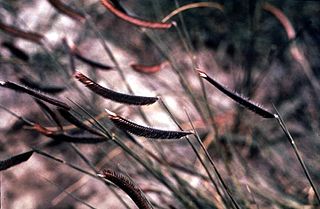
Bouteloua gracilis, the blue grama, is a long-lived, warm-season (C4) perennial grass, native to North America.

Bouteloua is a genus of plants in the grass family. Members of the genus are commonly known as grama grass.

Bouteloua dactyloides, commonly known as buffalograss or buffalo grass, is a North American prairie grass native to Canada, Mexico, and the United States. It is a shortgrass found mainly on the High Plains and is co-dominant with blue grama over most of the shortgrass prairie.

Arrhenatherum elatius, with the common names bulbous oat grass, false oat-grass, tall oat-grass, tall meadow oat, onion couch and tuber oat-grass, is a species of perennial grass, native to Europe, western Asia, and northern Africa.

Elymus glaucus is a species of grass known as blue wild rye or blue wildrye. This grass is native to North America from Alaska to New York to northern Mexico. It is a common and widespread species of wild rye.
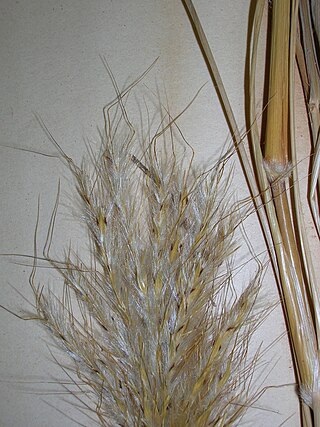
Bothriochloa barbinodis is a species of grass known by the common name cane bluestem. It is native to the Americas, including most of South and Central America, Mexico, and the southernmost continental United States from California to Florida.
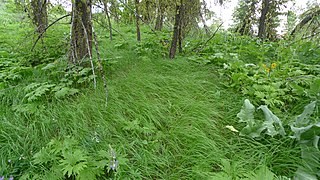
Calamagrostis rubescens is a species of grass known by the common name pinegrass.

Cynosurus echinatus is a species of grass known by the common names bristly dogstail grass, rough dog's-tail and hedgehog dogtail. It is native to southern Europe, and it is known in the Americas and Australia as an introduced species and sometimes a noxious weed. An herbicide-resistant strain can be found growing as a weed in canola and wheat fields in Chile. This is an annual grass growing 10 to 50 centimeters tall. The inflorescence is a rounded or oval cluster or series of clusters of spikelets. The fertile spikelet has an awn up to a centimeter long. The awns clumped closely together into a tuft gives the inflorescence its bristly, hairy appearance.

Muhlenbergia microsperma is a species of grass known by the common name littleseed muhly. It is native to the Americas from the Southwestern United States and California through Central America into Peru and Venezuela.

Bouteloua hirsuta, commonly known as hairy grama, is a perennial short prairie grass that is native throughout much of North America, including the Great Plains and Canadian Prairies region, as well as Mexico and Guatemala.

Setaria verticillata is a species of grass known by the common names hooked bristlegrass, rough bristle-grass and bristly foxtail. It is native to Europe, but it is known on most continents as an introduced species and often a noxious weed. It is a hardy bunchgrass which grows in many types of urban, cultivated, and disturbed habitat. It is a weed of many types of agricultural crops, growing in vineyards and fields. Herbicide-resistant strains have been noted.
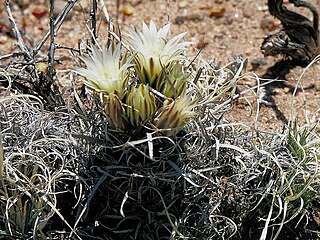
Sclerocactus papyracanthus is a species of cactus known by the common names paperspine fishhook cactus, grama grass cactus, paper-spined cactus, and toumeya. It is native to North America, where it occurs from Arizona to New Mexico to Texas and into Chihuahua, Northeastern Mexico.
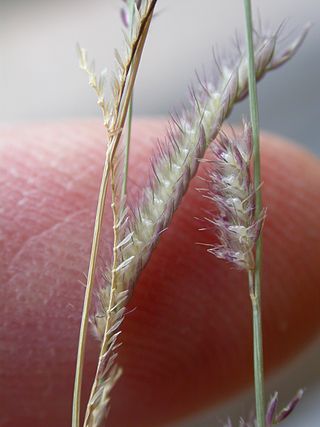
Bouteloua barbata is a species of grass known by the common name six-weeks grama native to North America.

Muhlenbergia cuspidata is a species of grass known by the common name plains muhly. It is native to North America where it is distributed across central Canada and the central United States.

Hilaria mutica, synonym Pleuraphis mutica, is a species of grass known by the common name tobosa, or tobosa grass. It is native to Northern Mexico, and the Southwestern United States, in Arizona, New Mexico, Oklahoma, and Texas.
Bouteloua breviseta is a species of grass known by the common names gypsum grama and chino grama.
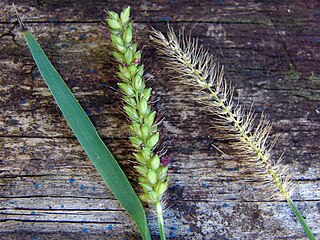
Setaria parviflora is a species of grass known by the common names marsh bristlegrass, knotroot bristle-grass, bristly foxtail and yellow bristlegrass. It is native to North America, including Mexico and the United States from California to the East Coast, Central America and the West Indies, and South America.

Bouteloua chondrosioides, commonly known as sprucetop grama, is a perennial bunchgrass native to southern Arizona and northern Mexico.

Bouteloua radicosa, colloquially known as purple grama, is a grass species in the grama genus native to the southwestern United States and northern Mexico.


















